Loft Mountain Campground — Shenandoah National Park
Four Day Trip
Spent four nights at this campground! No hook up but great spot to explore Shenandoah National Park
Shenandoah, Virginia provides varied camping options throughout the Shenandoah Valley and Blue Ridge Mountains. The region includes established campgrounds within Shenandoah National Park such as Big Meadows, Lewis Mountain, and Mathews Arm, all offering tent and RV sites with different amenity levels. Commercial options include several KOAs and private campgrounds like Endless Caverns RV Resort, which provide more developed facilities including water and electric hookups, showers, and in some cases cabin accommodations. Andy Guest/Shenandoah River State Park features tent sites, RV spots, cabins, and yurts in a scenic riverside setting, accessible by both road and boat.
Most campgrounds in the Shenandoah region operate seasonally, with peak availability from April through October. National Park campgrounds typically open in May and close between October and November, requiring advance reservations during the busier summer months. "The most interesting part about it is that there are bunnies running around everywhere. There is also a river to play in, tube down, or fish in," noted one visitor about their camping experience. Weather conditions vary significantly with elevation, and travelers should prepare for cooler temperatures even during summer months, especially at higher-elevation sites within the national park. Campfires are permitted at most locations, though firewood regulations may restrict bringing outside wood to prevent pest introduction.
Campers consistently mention the scenic mountain backdrop as a highlight of staying in the Shenandoah area. Several visitors commented positively about the proximity to hiking trails, particularly those accessing Shenandoah National Park's extensive trail system. Campgrounds near water features receive particular attention, with riverside locations at Shenandoah River State Park allowing direct water access. A camper wrote, "There are some campsites right on the river, which are beautiful." While national park campgrounds offer more rustic experiences with vault toilets and no showers, private facilities typically provide full bathhouses and amenities like camp stores. Sites range from densely arranged layouts at KOAs to more secluded spots in the national park, giving campers options based on their preference for socialization or solitude.
$30 - $75 / night
"This campground is located in the Shenandoah National Park in Stanley , Va on Skyline drive and offers some amazing views!"
"While the campground is very nice, with clean conveniently located bathrooms, the site itself is probably not suited for a large group of people."
"Positive: Friendly staff, close to Shenandoah NP, quiet camping, every site has a fire pit. Negative: Pricing rather high"
"We stopped here for one night so we could visit Shenandoah National Park. The campground was extremely pleasant, as were the staff on duty. The sites were more spaced out than is typical for a KOA."
$30 - $75 / night
"Loft Mountain Campground is a large national park service campground on the southern end of Shenandoah National Park."
"Loft Mountain was the third stop on our tour of Shenandoah National Park. First stop traveling south on Skyline Drive was Mathews Arm and second was Big Meadows at about the halfway point. "
$30 / night
"It's quieter than the other Shenandoah sites, it has clean facilities, showers, water, and a store, and is right on the Appalachian Trail with tons of access to other trails."
"As usual any campground in the Shenandoah national Park is well-kept, well cared for, and just beautifulWe have stayed in all the campgrounds on the 101 mile stretch of the Blue Ridge Parkway and with"
$45 - $249 / night
"This is a lovely RV park built up a mountain side overlooking the picturesque Shenandoah Valley, located in a deep old hardwood forest."
"July 10-19, 2020 As my wife and I were discussing my review, I asked her what could we point to to take away from a 5-star rating. Neither of us could think of a single thing."
"Close to Shenandoah National Park and Skyline Drive."
"They had plenty of appearances of Yogi or Cindy bear at activities and just driving around the park on a golf cart."
$34 - $220 / night
"We had a great stay at Spacious Skies Shenandoah Views in Luray, VA. "
"We stayed at this KOA on our way to Virginia Beach but wanted to a day in Shenandoah National Park. "
$30 - $75 / night
"This is a nice and very large campground tucked away in the northern part of Shenandoah. The facilities and grounds were well kept and it’s a short car’s travel (but there’s also a trail!)"
"The views on the drive through Shenandoah and skyline drive are not to be missed. Easy access to hiking trails
The bathrooms were not super clean, but doable."
$25 - $30 / night
"Convenient location, nice setup with tables and chairs around 2 firepits, space to spread out, and plenty of firewood provided. Friendly host. Thanks!"
"Accessibly located and cute as all get out!"
$30 - $40 / night
"Private showers, no WiFi, firewood on site, lots of shade, trails and walking distance to the river. Highly recommended. Close access to Shenandoah National Park."
"There are several rustic campsites located on the Southfork of the Shenandoah River, as well as modern electric sites, RV sites, and cabins. Park and campgrounds are clean and well maintained."
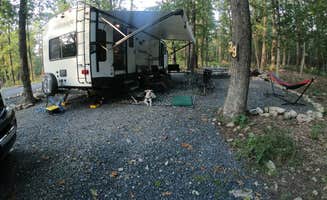
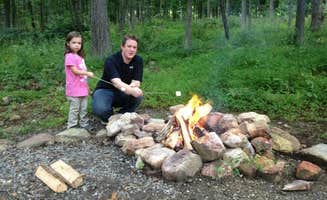

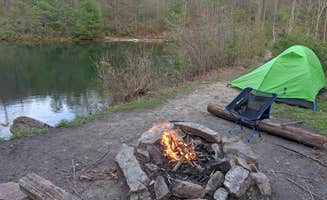
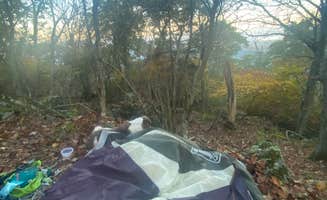
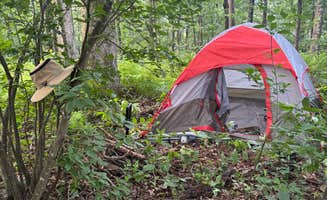
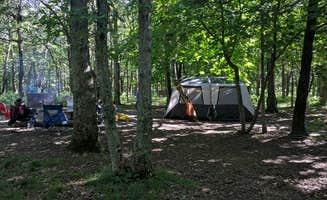
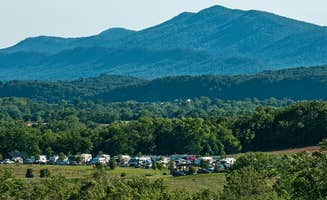
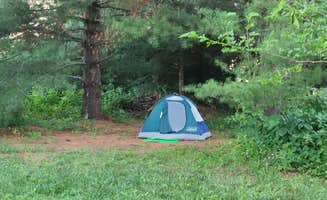
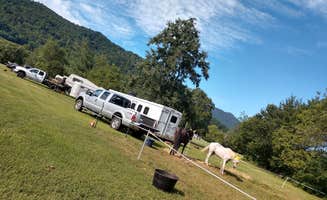
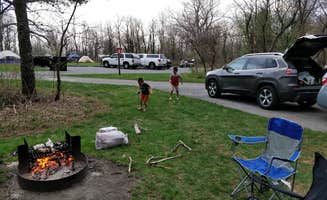
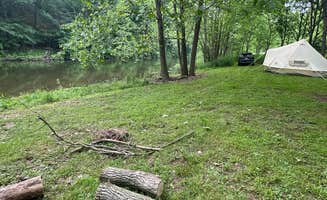
Spent four nights at this campground! No hook up but great spot to explore Shenandoah National Park
Spent the weekend in our 18ft pull behind camper for the 20th anniversary of BRO Magazine! The camping spot was level and had 30 amp hookup. The only thing that could be better was space and shade.
This is our third year coming in the winter. We always come for a long weekend. Got snowed in this year but owner cleared driveway and made sure we could get out on time. Bathroom was open and showers worked.
This is a very nice little KOA about 20 minutes outside of Charlottesville. It is an older property that they have modified to accommodate modern day RV's. This place is very quiet. There is plenty of shade to take advantage of on those hot summer days. While the property could use a little TLC, it is very clean and the hookups are all modern and work well. We stay here when my wife has doctors appointments at the UVA Medical Center. We highly recommend this campground when visiting the Charlottesville area.
The Shenandoah Mountains are beautiful any time of year, but early fall is spectacular. Ripe blackberries underlie the whole landscape everywhere you go, trees are turning magnificent colors, songbirds are stopping over on their migration south, bugs are nearly non-existent. I enjoyed visiting the park and camping here, especially as it is one or the few National Parks that are dog-friendly and allow dogs most everywhere, --throughout campground, on most trails, and even on the outside deck at cafe by our campground. The park also participates in the "Bark Ranger" program for dogs.
This campground is one of three main campgrounds in the park, and has a Campground store as well as nearby cafe featuring variety of sandwiches, soups and desserts, including local blackberry ice cream! So you will be well-provided for. There is a maze of trails around the campground itself, and just down the Skyline Parkway is access to the Big Run trail network, which provides great birding, hiking, and fishing
Even in the campground among many campers, there is great access to the Dark sky which is great for stargazing. Ranger programs in the campground feature this and other nature programs. From the campground there is easy access to myriad scenic overlooks along Skyline Drive in both directions. There is a fairly long drive to get to the north end of the park at Big Meadows which is the northernmost campground and where the NPS Visitor center is. The scenic drive but you do have to double back a long way to get back to Loft campground.
Make reservations well ahead of time! Most sites need to be reserved, a few available for same day. Campground fills up early in the day. Tent campers are more likely to get a spot. We got the last site of the day. It had a good drive in for a couple cars, but the tent pad was pretty small. There was a picnic table and fire ring, but the campsite itself was a little overgrown and in need of maintenance. The bathrooms were in need of some cleaning too; usually the National Park Service is good about this, but the park was short staffed and so things were a little rough around the edges. As such, although I would rank the park as a 5, the quality of the campground was only so-so, and overall I ranked the camping experience a 4 because of this
Switzer lake has a lot of campsites to choose from, however this is a popular destination so I would recommend securing a site as early as possible. Due to the conditions of the road I would not recommend taking a car with a low clearance. Preferably a car with at least AWD is recommended. As others have pointed out some sites get trashed by ne’er-do-wells, but besides that it's a very beautiful area.
Quiet and easily accessible. There was only one other vehicle there during my one night stay. Sone trash which was a shame but still a nice area to set up camp
I love this campground. It is quiet. The sites are spread out pretty well. There is a small river. The road in is beautiful, winding along a river. There isn't a lot of traffic. Between May and October the restrooms are open and are well kept. I have not used the pit toilets, as I prefer to bring my own set up. I have camped here several times in March and October. Only once was I completely alone in the campground. In the warmer season, there is a host. When you choose your site, look up for acorns that might fall onto your vehicle. I have a nice little dent from one. I have never had a problem with mosquitoes or critters at this campground.
Update:2/25 campground was open despite about 6" of snow on the ground. Loops were plowed, but sites were not. Not a problem for 4wd. Host was present as well.
Lots of potential, sites were level but really close together…could hear our neighbor’s conversation inside our RV. Creek site was nice with sounds of running water. Good variety of sites for tent, RV and cabins. Amenities are good, but my boys wanted the jumping pad harder…maybe cold weather kept it a bit soft? Bath house is really far away, not convenient for sites. A bit of a rough check-in , when we came into office they had our reservation for a week later and said they had no openings. They said they had a new system but were not apologetic for error. They were able to get us into a site for our stay but definitely lacked the level of service I expected. Not the greatest first impression of the staff. All in all, decent camp area in a great location close to entrance of Shenandoah NP. We have visited this area several times and would stay here again because of the location….I would just call to confirm reservation before I show up next time.
Shenandoah camping experiences vary dramatically by elevation, with temperatures often 10-15 degrees cooler on mountain campgrounds compared to valley locations. The region spans elevations from approximately 600 feet in the valley to over 3,500 feet along the Blue Ridge Mountains. Winter camping requires preparation for overnight temperatures that can drop below freezing, while summer campers should anticipate afternoon thunderstorms that typically roll through between 2-5 PM.
Hiking accessible from campsites: At Lewis Mountain Campground, trails start directly from the camping area. "Lewis Mountain is right next to the AT and convenient to closer hikes like Bearfence Mountain (probably my favorite hike in the park - beautiful 360 degree views from the rocky summit) and the short trail up to Lewis Mountain itself," notes one camper who saw "6 black bears, a barred owl, tons of awesome bugs, brook trout, a salamander" during their stay.
Mushroom farm tours: Visit Hawk Nest Mushroom Farm for a unique camping experience where you can learn about mushroom cultivation. "We got a nice tour of the mushrooms currently growing at the farm. The camp area sits under a canopy of cedar trees," explains a camper who appreciated this distinctive experience just 20 miles from Shenandoah National Park.
Waterfalls and scrambles: Multiple waterfall hikes start near camping areas. "It is in middle of everything. Great hikes nearby including waterfalls and rock scrambles," mentions a Lewis Mountain visitor. Mathews Arm campers can access Overall Run Falls via a trailhead in the parking area, creating a loop hike using different return routes.
Dark night skies: The lack of light pollution at several Shenandoah area campgrounds allows for exceptional stargazing. At Loft Mountain Campground, campers experience true darkness that reveals the Milky Way. One visitor shared, "We had the tent area to myself, it was quiet at night in my little corner of camp and I could walk out a bit from my site and see the entire night sky which was amazing!"
Wildlife encounters: Deer sightings are extremely common throughout the region's campgrounds. At Big Meadows Campground, a camper observed: "You will definitely see deer in the campground as they walk through and browse the understory. They are unafraid of humans unless directly approached." Another noted, "And finally, the fireflies are spectacular. At dusk, the ground shimmers, and then after they disperse, you will still see them flit by the tent throughout the night."
Seasonal spectacles: Fall foliage peaks from mid-October through early November, while wildflowers bloom most profusely in April and May. "The mountains are among the most beautiful in the fall. The leaves turn golden, and it is absolutely beautiful and worth your time," shares a Mathews Arm camper. Summer brings firefly displays at higher elevation campgrounds.
Variable weather conditions: Mountain campgrounds experience weather changes rapidly. At Endless Caverns RV Resort, campers note that weather systems move quickly across the valley. "Roads are gravel and can be a bit steep, 4-wheel drive is helpful," advises one visitor, while another reports camping comfortably in April when temperatures ranged from 40-70°F in a single day.
Limited connectivity: Cell service and WiFi are unreliable throughout the region. "No cell service. We went to the visitor center and connected to the WiFi if we needed to do something online," shares a Big Meadows camper. Another visitor to Endless Caverns notes, "Cell signal and camp wifi are bad. I was just able to get a decent signal with Starlink by carefully pointing at a small gap between trees."
Campground elevation differences: Valley campgrounds can be 10-15°F warmer than mountain sites. "Remember this site is on the peak of a mountain, so it can get pretty chilly at night," warns a Lewis Mountain visitor. During summer months, valley locations regularly reach the 90s while mountain sites remain in the 70s.
Ranger programs: Participate in educational activities scheduled throughout summer and fall. "Nice amphitheater with interesting ranger programs. Busy traffic in park but nice trails are accessible from campground," explains a Big Meadows visitor. Programs often include night sky viewing, wildlife talks, and junior ranger activities.
Swimming options: Andy Guest/Shenandoah River State Park offers river access directly from primitive campsites. "The primitive spots are right next to the river. The spots are a short walk from the parking area and the campground provides wagons to transport your stuff. Great fishing and swimming right at your camping spot," reports a camper who found it ideal for children.
Food storage requirements: All food must be stored securely to prevent wildlife encounters. "Bear box for food storage. Loved seeing the deer so close and other wildlife," notes a Big Meadows camper. Another visitor cautions: "You can be fined for leaving food out." National Park Service regulations require food storage in vehicles, hard-sided containers, or provided bear boxes.
Site selection matters: At Harrisonburg-Shenandoah Valley KOA, RVers recommend specific areas for privacy and views. "Site 71 best for privacy. Pool, playground, frisbee golf & pizza delivered to your site!" shares one visitor. Another experienced camper advises: "It's about 3 miles off highest 81, and no highway noise at all. So peaceful."
Limited hookup availability: National Park campgrounds typically offer no or very limited hookups. "Biggest campground in Shenandoah so can usually find a spot," notes a Loft Mountain visitor, though they caution that amenities are basic. RVers needing full hookups should look to private campgrounds like Endless Caverns RV Resort, which offers "stone borders, stone walls, and stone fire pits at every site, plus full hookup at each site."
Generator restrictions: Many campgrounds enforce generator-free periods or zones. "Generator-free area: No generators are allowed in parts of the A and B sections," explains a Mathews Arm visitor. Quiet hours generally run from 10PM to 6AM at most campgrounds, with some enforcing complete generator bans during these times.
Frequently Asked Questions
What camping is available near Shenandoah, VA?
According to TheDyrt.com, Shenandoah, VA offers a wide range of camping options, with 145 campgrounds and RV parks near Shenandoah, VA and 21 free dispersed camping spots.
Which is the most popular campground near Shenandoah, VA?
According to TheDyrt.com, the most popular campground near Shenandoah, VA is Big Meadows Campground — Shenandoah National Park with a 4.5-star rating from 120 reviews.
Where can I find free dispersed camping near Shenandoah, VA?
According to TheDyrt.com, there are 21 free dispersed camping spots near Shenandoah, VA.
Keep Exploring